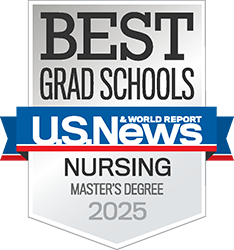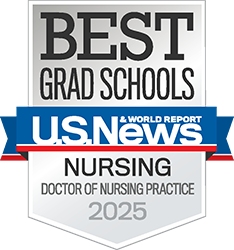The Value of Nursing Science Three alumni share their perspectives

The integral role that nurses play in health care empowers them to drive scientific discovery and ultimately enhance outcomes for patients, families, communities.
At Cizik School of Nursing at UTHealth Houston, innovative nurse scientists are propelling rapid growth in National Institutes of Health funding. Their research projects reflect the connections nurses make with their patients and the importance of those relationships in improving quality, safety, and health care outcomes. Prevention and treatment of HIV and stroke, nonpharmaceutical pain management, symptom tracking, food insecurity, and caregiver support are just a few of the many topics that nurse scientists at Cizik School of Nursing are exploring.
Alumni of the Doctor of Philosophy in Nursing (PhD) program are also seeking answers to timely and important questions. We asked three recent Cizik School of Nursing graduates what sets nursing science apart from other disciplines.
Brennan Streck, PhD, MPH, RN, CNE
An aptitude test Streck took during her undergraduate years at The University of Texas at Austin suggested she would be well suited to a career in either medicine or social work.
“I felt that nursing was a blend,” she said. “Nursing embraces holism, looking at psychosocial factors as well as physical ones.”
While earning her Bachelor of Science in Nursing (BSN), Streck became involved with a group trying to find a bone marrow match for a boy with leukemia. The experience inspired her to become a pediatric oncological nurse and eventually a bone marrow transplant coordinator. That role blended administrative and clinical work and gave her a broader view of cancer survivorship.
“I realized I really wanted to help solve problems instead of just treating their effects,” Streck said. “In my PhD program, I found my people and my place. I started bringing the questions that I was asking in the workplace into my PhD program.”
She completed her PhD at Cizik School of Nursing in May 2020 and recorded a speech representing her cohort for inclusion in a virtual commencement. However, the pandemic did not stop her from jumping right in to her nursing research career. She accepted a fellowship through the Cancer Prevention Fellowship Program at the National Cancer Institute (NCI) and spent three years in the Washington, D.C., area studying cancer survivorship.
Now she is back in her hometown of Dallas working remotely as a program director for the NCI. In this role, she writes requests for funding applications and manages a portfolio of active grants that involve psycho-oncology, palliative care, and cancer-related pain.
Streck also spends part of her time pursuing her own research interests. She is currently exploring decision-making biases of cancer survivors and psychosocial determinants of biological aging.
“I am very passionate about nurses having a voice in research because, frankly, at the bedside we are the team members who spend the most time with the patients,” she said. The conversations nurses have with patients while setting up IVs or providing medications may seem like small talk, but they provide insights that other members of the health care team are not privy to. “It’s that collective knowledge that you build over the years that helps you to become a good nurse and a thoughtful scientist.”
At the NCI, colleagues in interprofessional meetings often gravitate to her because of her perspective. Her experience on the front lines as a cancer nurse makes her voice valuable and unique since many of her colleagues only have experience in bench science or in fields other than cancer.
“Nursing research strengthens and is strengthened by collaborations,” she said. “There are a lot of scientific teams out there that are missing a nursing voice, and a lot of nursing research that is missing a voice from other health care providers. I hope that nurse scientists recognize how valuable and necessary they are to drive science.”
Annalyn DeMello, PhD, MPH, RN, CNE
DeMello was working as a research nurse for a hospital surgical department when she decided to return to her undergraduate nursing alma mater to pursue her PhD.
“Really, what the school helped me do was find my own path,” said DeMello, who graduated in August 2020.
For her dissertation, DeMello studied suicidal ideation among lesbian, gay, and bisexual youth. Now an assistant professor at The University of Texas Medical Branch at Galveston (UTMB), her program of research has evolved to include gun violence as well.
“In the past, federal funding was nonexistent for firearms research,” she said, referring to the Dickey Amendment, a spending bill provision passed by Congress in 1996 that prohibited agencies from using government funds to “advocate or promote gun control.” After multiple mass shootings in the U.S., Congress in 2018 clarified that the provision did not apply to gun violence research.
“People have come to realize that we aren’t talking about gun control, we’re talking about gun safety,” DeMello said. “We need to keep guns away from people who mean to do harm to others and themselves.”
She recently completed a qualitative study of patients with gunshot wounds at the UTMB hospital and is currently conducting a study aimed at integrating firearm injury and public health surveillance data to enable activation of mobile health resources more efficiently.
“I work in the realm of public health and population health, so as a nurse, I communicate with the community and am an interface between science and the population,” DeMello said.
Medical science typically focuses on treating injuries. By contrast, the nursing profession’s focus on health promotion and injury prevention forms the basis of many nursing research projects, whether they involve laboratories, informatics, or patient interventions, DeMello said. Nurses excel at translational science, which bridges the gap between academic research and practice.
“As nursing clinicians, we are at the front line of the hospital, and we spend the most time with patients,” she noted. “Nursing attracts people who are committed to improving the lives of others and society, so I think inherently we make good researchers, because we can see the end point and conduct applicable science.”
Christian Paige Owen, PhD, RN, CEN
“I think everybody wants to change the world when they start graduate school, and I knew I would be challenging the status quo by studying nurses, not patients,” said Owen, who earned BSN and MSN degrees at Cizik School of Nursing before coming back for her PhD. She successfully defended her dissertation in February 2024.
Owen worked in emergency nursing for years and eventually became a forensic nurse, exclusively serving patients who had experienced sexual and physical assault. After two and half years, the job took an emotional toll, leading her to a different path teaching high school health science.
Even though she enjoyed being a forensic nurse, the effects of working with traumatized patients day after day lingered. “In that first month after I left forensic nursing, I experienced emotional and physical symptoms. At times, I felt like my pager was going off on my hip despite not having a pager anymore. I experienced nightmares and avoided watching the news. I feared talking about my symptoms but later realized that what I experienced was not abnormal,” she said.
Owen’s own experience led her to research secondary traumatic stress among Emergency Department (ED) nurses. Psychological distress goes beyond burnout in EDs and cuts short the careers of many nurses, she noted. “You are that first line of care for people who are having the worst day of their life. Our empathy for trauma victims makes us vulnerable,” she said.
During the PhD program, Owen published a systematic review of maladaptive coping strategies among emergency health care professionals. She found that such strategies are common and associated with poor mental health outcomes. Environmental factors like work stress and heavy workload contributed to emergency health providers using maladaptive coping.
These findings inspired her dissertation study, in which she explored the prevalence and predictors of secondary traumatic stress in emergency nurses. She found that the mean average of secondary traumatic stress among emergency nurses in her sample fell into the “severe” category.
“Coping strategies and the work environment play a significant role,” she said. “Nurses who access support resources and view their work environment favorably are going to have lower levels of secondary traumatic stress.”
Owen currently puts her nursing science background to work as a product manager focused on workforce development solutions that improve clinical competency. With nursing burnout becoming a higher-profile topic in the wake of the COVID-19 pandemic, she is also pursuing opportunities to further her own research.
Owen sees great opportunity for collaboration between Doctors of Nursing Practice (DNPs) and PhD-prepared nurses to make quality improvements in health care.
“When you look at nursing science as a whole, it takes all of us. DNPs and PhDs working together can help identify, clarify, and implement solutions to address complex problems,” she said. “The PhD program at Cizik School of Nursing has taught me the importance of collaboration in nursing science and the power we have when we work together.”



